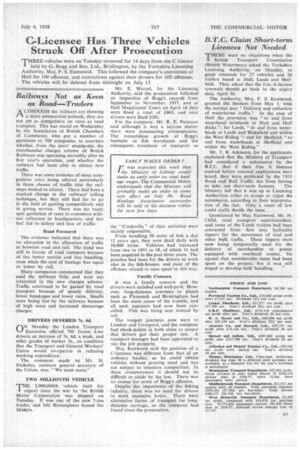C-Licensee Has Three Vehicles Struck Off After Prosecution
Page 47

If you've noticed an error in this article please click here to report it so we can fix it.
THREE vehicles were on Tuesday removed for 14 days from the C licence I held by G. B.ogg and Son, Ltd., Bridlington, by the Yorkshire Licensing Authority, Maj. F. S. Eastwood. This followed the company's conviction at Hull for 100 offences, and convictions against their drivers for 102 offences.
The vehicles will be deleted from midnight on July 13. • Mr. E. Wurzei, for the Licensing Authority, said the prosecution followed an inspection of Bogg's records from September to November, 1957, and at Hull Magistrates' Court on April 14 they were fined a total of €463, and nine drivers were fined £18.1.
For the company, Mr. R. E. Paterson said although it was a serious matter there were extenuating circurnStances. The tremendous growth of Bogg's business as fish. merchants and the cOnsequent treatment •of transport as
the "Cinderella" of their activities were mainly responsible.
From handling 50 stone of fish a day 12 years ago, they now dealt daily with 10,000 stone. Vehicles had increased from two in 1951 to 18, of which 11 had been acquired in the past three years. The practice had been for the drivers to work also in the fish-houses, and most of the offences related to time spent in this way, Family Concern It was a family concern and the drivers were satisfied and well-paid. However, long-distance journeys to places such as Plymouth and Birmingham had been the main cause of the trouble, and all such journeys had now been cancelled. Fish was being sent instead by rail.
The longest journeys now were to London and Liverpool, and the company had check-points in both cities to ensure that drivers got their proper rest. A transport manager had been appointed to run the job properly.
Maj. Eastwood said the position of a C-licensee was different from that of an ordinary haulier, as he could obtain vehicles without proving need and was not subject to intensive competition. In these circumstances it should not be difficult to abide by the law. There was no excuse for some of Bogg's offences.
Despite the importance of the fishing industry, there was no need for drivers to work excessive hotirs. There were alternative forms of transport for longdistance carriage, as the company had found since the prosecution.




























































































































